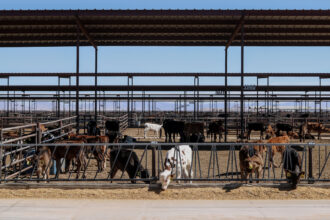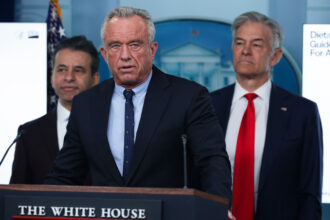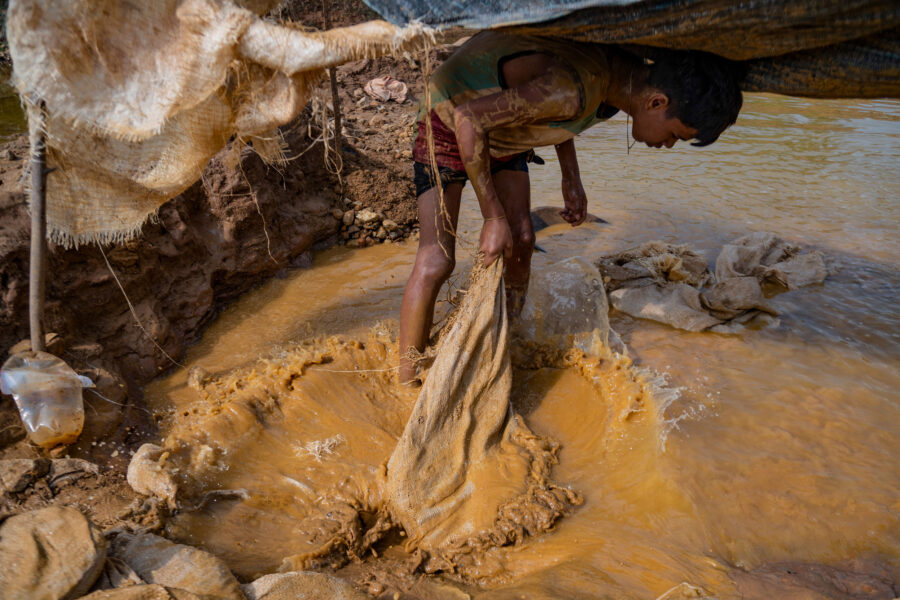Wednesday might have brought the announcement by the federal government that last month was the hottest September on record, but on Thursday night, the words climate change were barely mentioned in dueling town hall events held by President Donald Trump and Joe Biden.
Instead, the coronavirus pandemic, the economy and the battle over Amy Coney Barrett’s Supreme Court nomination dominated the questions posed to the presidential candidates during the forums.
Trump, who sat facing moderator Savannah Guthrie outside the Perez Art Museum in Miami, did not mention climate change in his answers and was not asked about it. He spent most of the one-hour town hall, hosted by NBC News, defending his administration’s record on combating the pandemic and boosting the economy.
The single question in either forum that touched on the environment was posed to Biden, who shared a small stage with moderator George Stephanopoulos at the National Constitution Center in Philadelphia for the hour-and-a-half event, hosted by ABC News. A woman from Pittsburgh stood up to say that fracking had “made people sick and killed wildlife,” and asked the Democratic nominee: “What industries that are not harmful to human health and the environment are you planning for Southwest Pennsylvania and the nation?”
Biden replied that he would not ban fracking but instead would regulate it to limit methane emissions and water pollution. He added that his climate plan would create jobs in Pennsylvania and nationally by investing in renewable energy and hiring unemployed oil and gas workers to plug abandoned wells, which can leak methane and oil into the air and groundwater. More jobs would come from funding to make homes and buildings more energy efficient, he said.
“Every time we talk about global warming or the environment, the president thinks it’s a joke and I think it’s jobs,” Biden said.
Fracking has allowed for a dramatic expansion of natural gas production in Pennsylvania, an important swing state. Trump’s campaign has seized on a statement Biden made before receiving the Democratic nomination—that his administration would allow “no new fracking”—to attack the candidate, claiming his policies would harm Pennsylvania’s economy. More generally, Trump has tried to paint Biden as a radical liberal who wants to end fossil fuel production.
Biden has since said repeatedly he would not ban the drilling practice, but has instead proposed limiting drilling on federal lands only.
But Biden devoted much of the limited time he spent addressing climate change appealing to centrists and distancing himself from the more progressive wing of his party.
In answering the woman from Pittsburgh, he said his administration would invest in carbon capture technology that he said could allow the nation to continue to use natural gas, while also reaching net-zero carbon dioxide emissions. Carbon capture and storage has broad support from both political parties, but has come under increasing fire from some climate activists, who say that oil and gas companies are using the technology to deflect efforts to limit fossil fuel use and production.
Biden also sought to distinguish his climate plan from the Green New Deal. Stephanopoulos pointed out that Biden’s plan calls the proposal a “crucial framework.”
“My deal is a crucial framework, but not the New Green Deal,” Biden replied, transposing the words in the name of the climate plan. “The New Green Deal calls for elimination of all non-renewable energy by 2030. You can’t get there. You’re going to need to be able to transition.”
But Biden may not have cleared up any confusion voters may have on the issue. The distinctions between the energy goals of the two plans are not much different. The Green New Deal resolutions, introduced in Congress in 2019, call for a 10-year mobilization that by 2030 would achieve “100 percent of the power demand in the United States through clean, renewable, and zero-emission energy sources.” Biden has proposed reaching net-zero carbon dioxide emissions in the electricity sector by 2035.
After a few minutes discussing energy and climate, the Biden town hall turned back to other topics, including racial justice and the coronavirus, that are increasingly seeming to crowd climate change out of the list of the top issues driving the election.
In Miami, Trump, making an appeal to undecided voters, invoked his administration’s record of slashing regulations—which includes working to reverse or roll back 100 environmental rules and climate policies—as one of a series of achievements. He closed with a promise: “Next year is going to be better than ever before.”
Despite his record of stripping away nearly all major federal climate policies, Trump this week signed an executive order supporting the global “trillion trees” initiative (in the debate last month, he called it “a billion trees”), and in recent months has made more references to his desire for “immaculate” air and water. In the earlier debate, he also responded to a question about climate change with a series of misleading statements about pollution and wildfires, and refused to acknowledge the settled science about the human contribution to the issue and its severity.
The two candidates may have another chance to highlight their contrasting positions on climate change next week, at a debate scheduled for Thursday, less than two weeks before Election Day.
About This Story
Perhaps you noticed: This story, like all the news we publish, is free to read. That’s because Inside Climate News is a 501c3 nonprofit organization. We do not charge a subscription fee, lock our news behind a paywall, or clutter our website with ads. We make our news on climate and the environment freely available to you and anyone who wants it.
That’s not all. We also share our news for free with scores of other media organizations around the country. Many of them can’t afford to do environmental journalism of their own. We’ve built bureaus from coast to coast to report local stories, collaborate with local newsrooms and co-publish articles so that this vital work is shared as widely as possible.
Two of us launched ICN in 2007. Six years later we earned a Pulitzer Prize for National Reporting, and now we run the oldest and largest dedicated climate newsroom in the nation. We tell the story in all its complexity. We hold polluters accountable. We expose environmental injustice. We debunk misinformation. We scrutinize solutions and inspire action.
Donations from readers like you fund every aspect of what we do. If you don’t already, will you support our ongoing work, our reporting on the biggest crisis facing our planet, and help us reach even more readers in more places?
Please take a moment to make a tax-deductible donation. Every one of them makes a difference.
Thank you,














